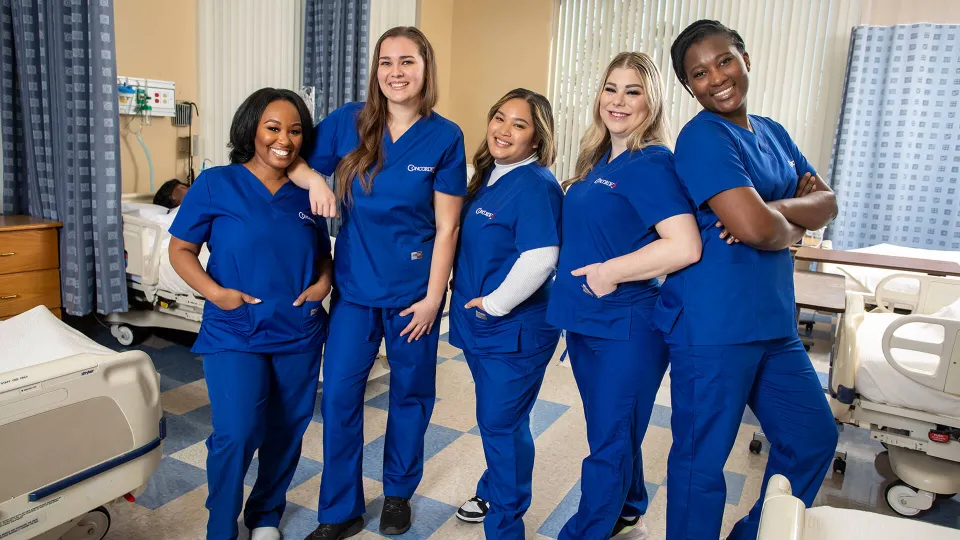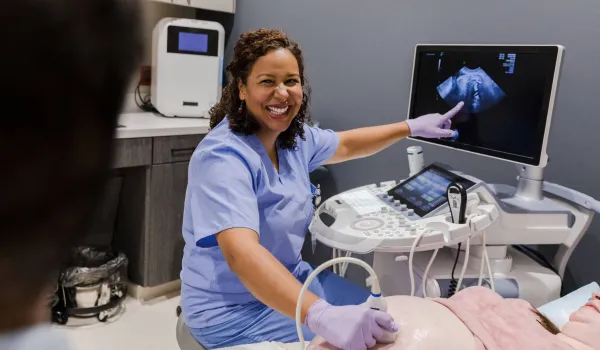
Registered nurses form the backbone of the medical industry, representing the single largest occupation in the healthcare industry with an estimated workforce of 2.7 million in the United States. Registered nurses (RNs) provide and coordinate patient care, educate patients, loved ones and the public about health conditions, and provide advice and emotional support to those in need.
Registered nurses are not only found in local hospitals, but also in schools, long-term-care facilities, physicians' offices, and anywhere people might be in need of quality medical care. This means that potential employers can be found in all kinds of places.
The U.S. Bureau of Labor Statistics paints a hopeful picture for the future of the nursing profession, with an estimated job growth between 2022 and 2032 of 6%. As the medical field continues to emphasize preventative care and a generation of Baby Boomers enters their twilight years, a career as a registered nurse offers the potential for decades of growth and job security.
Becoming an RN
Becoming an RN requires taking courses in a wide range of fields of study. Most RNs complete Associate Degree Nursing programs and then enter the field after passing the National Council Licensure Examination (NCLEX-RN). Nurses can also further their careers later on by completing bachelor level programs in nursing or other related fields.
Although most RNs start as staff nurses in hospitals or in community health situations, the prospect of advancement is substantial with a little hard work. Experienced RNs can often move into management positions or administrative roles at various medical facilities or associated healthcare industry companies.
Nursing isn't just about general healthcare either. Over time, nurses can develop specialties in their given fields of interest, such as types of people (senior, pediatric), individual conditions (diabetes, oncology), and even workplace (trauma, educational institutions). The type of specializations available to nurses are as varied as the individuals they care for, and can often lead to career advancement opportunities.
RNs: A Career with Options
Alternatively, RNs can enter the business side of the healthcare industry, lending their experience and expertise to the private sector, where their frontline knowledge is often coveted. Employers can range from insurance companies to pharmaceutical manufacturers, with positions across fields like marketing, consulting, and research and development.
The type of individual who makes a good RN is someone who is understanding, caring and focused, and who can empathize with patients as they experience difficult moments in their lives. Communication skills are paramount, and many nursing degrees emphasize learning how to be concise and informative in all aspects of their work. Because the job involves being responsible for the health of individuals, a career as an RN can be quite stressful. Therefore, caring for employees is a priority of employers, and resources are made available to ensure RNs can do their job to the best of their ability. Like many stressful jobs, the rewards can be immense, and many career nurses cite a high level of job satisfaction from helping people every day.
Ultimately, those who pursue a career as a registered nurse are starting on a path that can lead them into a fulfilling career- both financially and personally. The opportunities for specialization and the potential for advancement both translate into high career satisfaction. Combine this with working in an industry that prides itself on being at the technological forefront, and you have a fast-paced career choice with plenty of potential.
IMAGE SOURCE:
Registered Nurse
**Source: U.S. Bureau of Labor Statistics projected national growth in job openings for registered nurses 2022-2032 https://www.bls.gov/ooh/healthcare/registered-nurses.htm#tab-1. Projections are national. Local job market demand may vary.
Take The Next Step Towards a Brighter Future
Interested in learning more about our Nursing (Pre-Licensure) program?
We have a Concorde representative ready to talk about what matters most to you. Get answers about start dates, curriculum, financial aid, scholarships and more!







